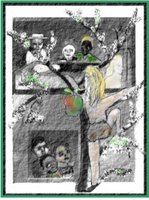
Like many of Faulkner's characters, Quentin Compson (male) is a complicated character. In a novel dominated by the memory as opposed to chronology, Quentin's section -- dated June 2, 1910, the day he drowned himself at the end of his first year at Harvard -- arguably emerges as the section most preoccupied with these themes. Why does Faulkner choose to have Quentin narrate his own section, even though he has been dead for nearly eighteen years? What do you make of his dual obsession with his sister's virginity and the loss of the family honor? Why does he attempt to make, in a crucial conversation with his father, a false confession of incest? Considering Quentin's own state of mind at the time, what do you think of Mr. Compson's response? And, finally, what are the reasons for Quentin's decision to drown himself?
Obviously you can't answer all of these questions in your response, so just pick some of them and try to comment critically and insightfully. Also be sure to read your peers' responses before posting your own -- try to say things that haven't already been said, and comment on what has been said.
Please post no later than Thursday, October 5, 4pm.



